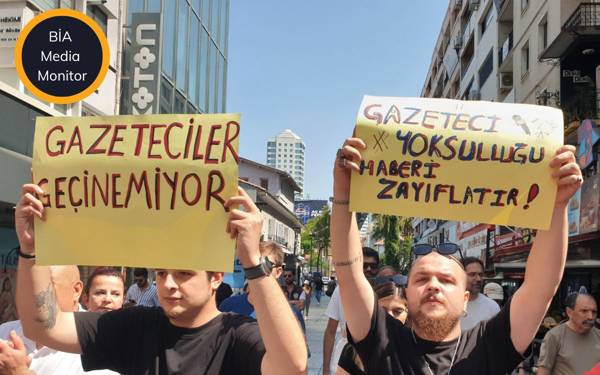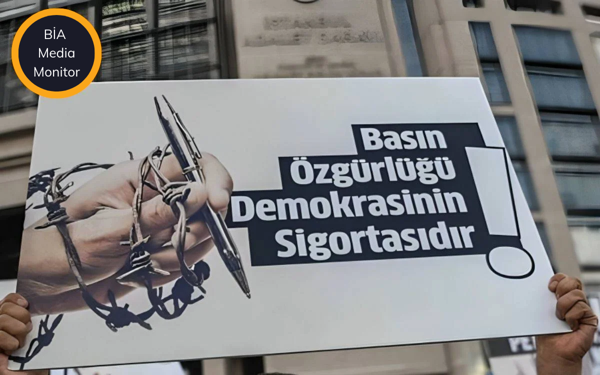22 Journalists Are Facing Jail
Turkish Foreign Minister Abdullah Gül admitted on Wednesday that harassment of writers and journalists under the provisions of Article 301 of the Penal Code has tarnished Turkey's image even worse than the "Midnight Express" did twenty years ago.
Last week, Member of the European Parliament Joost Lagendijk was quoted in the Turkish media criticizing the Turkish Armed Forces as well as the Kurdish guerrilla organization PKK for the deteriorating situation in southeast Turkey.
Reports have been leaked from a Beyoglu district court in Istanbul, saying that a public prosecutor is preparing a file against Lagendijk under complaints coming from a ultra-right-wing group of lawyers who believe the MEP's statement constitutes a violation of Article 301.
Celebrities are not an exception
The situation has grown even more alarming, as the journalists and writers victimized by Article 301 (which replaces Article 159 of the former penal code) are not confined to a few celebrities. All in all, 22 journalists have already been charged under the notorious Article 301 of the Turkish Penal Code in the second half of 2005.
Convictions
Since the new Penal Code took effect in June, local courts have convicted six journalists and writers in cases based on violations of Article 301. All these decisions have been taken to the Supreme Court of Appeals.
In eight trials, local courts have convicted journalists Emin Karaca and Hrant Dink, writer Zulkuf Kisanak, publisher Fatih Tas, Aziz Oner, the owner of the "Cagri" (Call) magazine, and a reader, Erkan Akay.
In these eight cases, the courts handed out fines of a total of 12,900 YTL (USD 9,600) and a total prison term of three years. 900 YTL (USD 600) of the total fines, and 1.5 years of the prison sentence, were deferred.
Court has no jurisdiction over the case of Korkmaz and Salaz
On December 27, a local court continued to try a journalist based on article 301. Journalist Ersen Korkmaz wrote an article titled, "The Leader of Kurds was Taken and Delivered to Fascists," after attending a panel in 2002. The article was published in Korkmaz's local southern newspaper, "Demokrat Istenderun" (Democratic Iskenderun). Necmettin Salaz from the Communist Party of Turkey (TKP), who spoke at the panel, also stands trial.
Judge Esmahan Yilmaz ruled that the court has no jurisdiction over the case and sent the file of Korkmaz and Salaz to another local court, which encompasses acts committed through the media.
Korkmaz, who criticized the length of the trial and asked for his acquittal at the hearing, said to bianet: "As a person who believes in the freedom of thought and expression, I published the expressions made at a panel."
"I never thought this would be considered a crime. Unfortunately, it is a crime to do that in our country. I have been standing trial since 2002. Penalizing me in this trial would be tantamount to penalizing Turkey with respect to the freedom of thought and expression" he told.
Korkmaz and Salaz face up to two years in prison if found guilty of violating article 301/2 in their report. Korkmaz will stand another trial on March 17, 2006 for "publicly insulting the government," in an article he wrote before the May 1 Labor Day.
Ferhat Tunc stands trial on December 28
Renowned protest singer Fehat Tunc, who criticized the courts for keeping former Democracy Party lawmaker Leyla Zana and others under arrest, in an article he wrote in the "Yeniden Ozgur Gundem" (Free Agenda Again) newspaper, stood trial in an Istanbul court on December 28.
Tunc and editor-in-chief Mehmet Colak are being charged with "insulting the court" by writing and publishing the article titled, "A Revolutionist Leyla and A Song," published on January 19, 2004. Tunc and Colak face up to three years in prison.
Writer Kisanak fined 3,000 YTL
A local court sentenced writer Zulkuf Kisanak to six months in prison for "publicly insulting the state" by writing a book named, "Lost Villages - How was Thousand Years' of Heritage Burnt Down?" The Istanbul court commuted the prison sentence to a fine of 3,000 YTL (USD 2,200). Zulkuf's book was on the Southeastern Anatolian villages that were burnt down by state forces.
Journalist Aziz Ozer fined 9,000 YTL
On the same day, another Istanbul court sentenced Aziz Ozer, the owner and editor-in-chief of the monthly "Yeni Dunya Icin Cagri" (Call for a New World) newspaper, to 18 months in prison for "publicly insulting the republic and the government."
The judge ruled that Ozer insulted the republic twice, and the government once, in articles titled, "80 Years of Republic of Turkey, 80 Years of Fascism," and "No to Becoming an Accomplice in Iraqi Occupation." The prison sentence was then commuted to a fine of 9,000 YTL (USD 6,700). The journalist appealed the decision through his lawyer Ozcan Kilic.
On December 1, a court had sentenced Aziz Ozer to a year in prison for "publicly insulting the government and the republic," by writing to articles, titled, "Who does AKP's bulb glow for?" and "We did not Forget the Massacre and we will Prevent it from being Forgotten."
"Reader" Akay convicted twice
The same court on December 14, sentenced magazine reader Erkan Akay to a year in prison for "insulting the Turkish identity and the Republic." Akay's prison sentence was deferred.
The court ruled that Akay's statements that the "Turks massacred the Armenians and committed genocide, [and] the murderers were then presented as heroes," and "the roots of the Republic of Turkey, which is called the New Turkey, stand in past murders, and the state was established on dirty secrets," constitute "insulting the Turkish identity and the Republic."
Five writers face 10 years in prison
Ismet Berkan, the editor in chief of the "Radikal" newspaper, Radikal columnists Erol Katircioglu, Murat Belge, Haluk Sahin, and Milliyet columnist Hasan Cemal are charged with "influencing justice," and "insulting the state's juridical institutions." The writers had criticized the cancellation of the Conference on Ottoman Armenians by a regional court.
The indictment stated that the journalists' comments that "the cancellation of the conference is a blow to freedom of thought" constituted a crime. The writers face six months to 10 years in prison if found guilty. They will stand trial on February 7 in an Istanbul court.
Cemal and Belge will be charged twice based on article 288 of the Turkish Penal Code (TCK) which punishes "publicly making an oral or a written statement with the aim of influencing the prosecutor, judge, court, experts or witnesses before the investigation or the trial ends through a final verdict," and on article 301, which is on "publicly insulting the state's justice institutions." Sahin and Katircioglu will be charged once based on the same articles. Berkan will be charged with "influencing judgement."
Publisher Fatih Tas sentenced to six months in prison
On October 20th, an Istanbul court sentenced publisher Fatih Tas of the Aram Publishing House to six months in prison for publishing a book named, "They Say You Are Missing." The book was about journalist Nazim Babaoglu, who was kidnapped on March 12, 1994 and never returned. Tas was found guilty of "publicly insulting the state.
Journalist Dink sentenced to six months in prison
On October 7, another local court sentenced journalist Hrant Dink to six months in prison for writing a series of articles on the Armenian identity. The articles were published in the weekly "Agos" newspaper owned by Dink. Dink was found guilty of "insulting the Turkish identity." The court deferred the prison sentence.
Dink's lawyer Fethiye Cetin appealed the decision. Karin Karakasli, the editor-in-chief of the newspaper, was acquitted in accordance with a regulation in the Press Law that holds managers exempt.
Dink, who spoke at the "Global Security, Terrorism and Human Rights, Multiculturalism, Minorities and Human Rights" panel in February 2002, has been sued again for "insulting the Turkish identity" in that speech. He will stand trial on February 9.
Court deferred the fine handed to journalist Karaca
Journalist-writer Emin Karaca was sentenced to five months in prison for "insulting the military forces" by writing articles on the 30th anniversary of the execution of Deniz Gezmis, Yusuf Aslan and Huseyin Inan. The articles were published in 2002 in the "Turkiye'de ve Avrupa'da Yazin" (Literature in Turkey and in Europe) magazine.
The court commuted the prison sentence to a fine of 900 new Turkish liras (USD 670) and then deferred it. Editor-in-chief Mehmet Emin Sert was
acquitted.
Professor Kabaoglu and Professor Oran to stand trial in February
Professor Doctor Ibrahim Kabaoglu, the former head of the Prime Ministry Human Rights Advisory Committee, and committee member Professor Doctor Baskin Oran, have been sued following an investigation by the Ankara Republic Prosecutor's Office into their report on Minority Rights and Cultural Rights. They will stand trial on February 15, 2006. The two professors face 1.5 years to five years in prison, based on articles 216/1 and 301/2 of the Penal Code.
Ankara Ekin Theatre also stands trial
The Ankara Ekin Theatre staged a play named, "How is an Underground Organization Established?" in Kocaeli on October 5, 2002. Ten actors and actresses and Osman Colakoglu, the head of the Education and Science Workers' Union (Egitim-Sen) have been sued for "insulting the security forces."
Journalist Ucar answers prosecutor's questions
Another journalist who may face legal action based on Article 301 is Irfan Ucar. Ucar, the general manager of the "Yeniden Ozgur Gundem" newspaper, had to answer questions at the Beyoglu Republic Prosecutor's Office for writing an article titled, "Number 301" in his newspaper on December 13, 2005. (EO/EA/YE)
BİA MEDIA MONITORING REPORT 2024
The government made journalists' lives a living hell in 2024

BİA MEDIA MONITORING/OCTOBER-NOVEMBER-DECEMBER 2024
Truth concealed through repression from all sides targeting journalists

BİA MEDIA MONITORING REPORT
Just silence the journalist, and I won't touch you!

BİA MEDIA MONITORING APRIL-MAY-JUNE 2024
Journalists are on the target and have no legal security anymore!

BİA MEDIA MONITORING REPORT
The era of 'judicial control' confinement and torture in journalism





